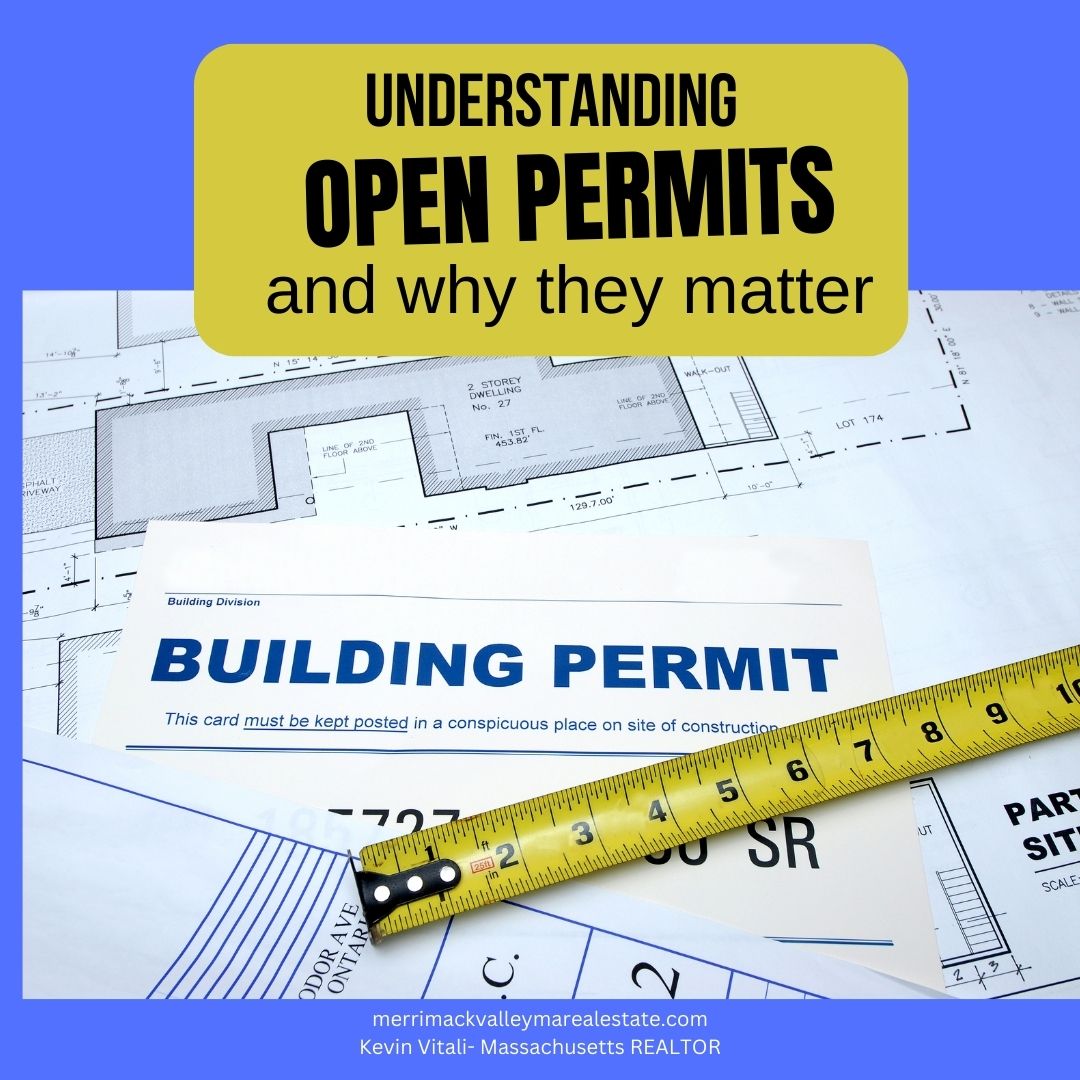 Regarding property ownership and real estate, open building permits can be a source of confusion and concern for Massachusetts property owners, home buyers and sellers.
Regarding property ownership and real estate, open building permits can be a source of confusion and concern for Massachusetts property owners, home buyers and sellers.
Open building permits have become more problematic as individual towns pay more attention to them today as opposed to 20 years ago. And as towns are paying closer attention to them, so are the real estate attorney and buyer’s agents representing the buyers. They want open permits closed out before the buyer closes on the home.
We will look at what they are, why they matter. We will also examine how they impact the purchase and sale of a home.
We’ll also provide valuable insights on checking, resolving, and complying with open building permits, along with answering common questions that homeowners often have. Let’s dive into why homeowners, home sellers and home buyers should be concerned with any building permits that have not been closed out on a home.
Jump To A Section....
What Is An Open Permit On A House
Open building permits refer to permits issued for construction or renovation projects that have yet to be closed or finalized.
These permits are typically granted by local government authorities to ensure that construction work adheres to safety codes and regulations. However, when these permits remain open, they can cause significant issues for property owners, home sellers, and buyers.
Open Building Permit Requirements and Exceptions
Each locality has its own set of rules and regulations regarding open building permits. Understanding the specific requirements and exceptions related to open building permits is essential.
Some areas might have strict deadlines for closing permits, while others may allow extensions under certain circumstances.
Being aware of these rules can help you navigate the process effectively. Extensions can certainly be granted if you request one before the expiration date and the work has been started.
If the work has not been started at the end of the six months, a new permit may need to be pulled.
Most often, with open building permits, the work has been done, but the contractor or DIYer never went through the process for the final inspection and closed the building permit.W
Open Building Permits And Buying or Selling A Massachusetts Home
Over the past several years, building permits that have not been closed out have become problematic for home sellers and buyers. Many towns now pay more attention to these permits than in the past.
The problem is that if there is a record of any building permits on your home. And, the building department can see if they have not been closed out. You may incur fines, penalties, additional fees, revoke occupancy permits, or force completion of the work/removal of work and closing out the permit.
While I have yet to see a town actively pursue an open permit, the issue is that you cannot obtain a new building permit for any additional work until you close out the all of the permits.
Not a big deal?
What if you are under the gun to pull a permit for a roof replacement because the roof is leaking? You discovered an open permit for a previous renovation ten years ago. You are now on the hook to close the permit before opening another.
The Problems Open Building Permits Cause
The problem is twofold. Work performed under an open permit must conform to the building codes in effect today if you need to close on out. So, a permit that is 10 years old could substantially change the building codes today versus when the work was done.
And now you need to bring the work up to today’s current codes.
Secondly, a significant change in the codes could mean dismantling some of the work previously done to inspect or bring the work up to current codes.
 How Do They Affect Home Buyers?
How Do They Affect Home Buyers?
Once you close on your new home, you are responsible for any permits left open on the house. You are not only taking possession of the home but also taking possession of any permits left open by previous owners.
This can be a costly endeavor with many unknowns for Massachusetts home buyers.
As the home buyer or agent representing you, you must do your due diligence, find out if any permits exist, and remain open.
If building permits that have never been closed, discuss with your real estate attorney the potential downsides and how to handle them with the home seller.
Be very wary of taking on the cost and hassle of closing out building permits left open.
How Do They Affect Home Sellers
These permits can be equally problematic for home sellers. They can affect the ability to sell your home and/or the value.
A savvy real estate agent representing a home buyer will check with the building department to see if any permits remain open.
When selling a home, building permits that have never been closed can become a significant roadblock. Potential buyers may hesitate to purchase if they discover them, as they don’t want to inherit any unresolved issues.
As a seller, addressing these permits before listing your property is crucial to avoid delays and lost opportunities.
Title insurance companies are now becoming wary of open permits. And in some instances, they may not provide title insurance for the home. Now your property cannot provide a marketable title, and you home can become unfinanceable.
How Do You Sell A Massachusetts Home With Open Building Permits?
The first remedy is to close any permits that have remained open. This can be the best solution and does not leave any unknowns for the home buyer. If there are any permits left open that were found late in the process, it could delay the closing.
The second remedy is to offer a credit to the home buyer for them to close out the permits after they purchase the home. The downside is permits that were never closed have a lot of unknowns associated with them and a buyer would need to be comfortable with those unknowns before purchasing.
The last remedy is the seller can disclose the home has open permits on the property disclosure and sell the home as-is. The downside of passing them to the new owner is it could affect the home’s value. Homes marketed as-is typically sell for less, affecting the sellers bottom line.
How Do You Remedy Open Building Permits On A House?
Whether you are a homeowner, a home seller or a home buyer, it will be important to close out any outstanding building permits on your home.
How to Check Permits That Remain Unclosed On A House
If you’re a current property owner, home seller or looking to purchase a new home, it’s crucial to check for any open building permits associated with the home.
Doing so can save you from potential headaches in the future. Contact your local building department or visit their website to check for open permits. They will have records of all issued permits, including the ones that are still open or unresolved.
Resolving Open Permits Efficiently
If you discover permits that have never been closed on your property, it’s crucial to address them promptly. Leaving permits unresolved can lead to serious consequences, such as fines, penalties, or even difficulties in selling your home.
Working with a licensed contractor or professional who can complete the necessary inspections and paperwork can help expedite the resolution process. Start with the contractor who opened the permit and request they close out the permit.
City Regulations for Open Permits
Cities have unique regulations concerning their permitting process, and it’s essential to comply with them.
Ignoring open permits or failing to resolve them promptly can result in complications when selling your property or trying to pull a permit for new work on your home.
Assessing the Status of Expired Building Permits
Expired building permits are another concern for homeowners. It’s essential to assess the status of any expired permits and take appropriate action to renew or close them.
An expired permit may require inspection and approval before closure, so don’t miss this crucial step. It is ultimately the homeowner’s responsibility to have a permit closed on any work done on the property.
Massachusetts general law states an open permit expires after ten years. But most towns can override the law and have more stringent requirements. Many will require you to close out permits older than ten years old permits.
Consequences of Ignoring Permits That Were Never Closed
Ignoring unclosed permits can have severe consequences, ranging from financial penalties to legal liabilities for a homeowner.
If you are selling a home it can wreak havoc on the sale. Buyers may not want to take on the building permits, that were never closed, it could significantly delay a closing or even possibly make your home unable to obtain title insurance,
As a home seller, it’s essential to resolve these permits proactively to maintain a smooth and hassle-free property ownership experience.
If you are a home buyer, remember if the permits are not closed before you purchase the home, you are now the owner of all the potential problems that come with open permits.
Being proactive regarding closing out a permit on your home. It can save you from potential headaches down the road. Always seek professional advice to ensure a seamless and compliant property transaction.
Frequently Asked Questions About Open Building Permits
What Are Open Permits And Why Do They Matter
How Can An Open Permit Impact a Massachusetts Home Sale?
Can A Sell A Home In Massachusetts With Open Permits?
Should I Buy A Home With Open Permits?
Can Open Permits Affect My Homes Marketability?
Do Open Permits Expire In Massachusetts?
How To Check For Open Permits On A House
Conclusion
Understanding open building permits and their implications is crucial for Massachusetts property owners, home buyers, and sellers. Open permits, which refer to permits issued for construction or renovation projects that have not been closed or finalized, can pose significant challenges for all parties involved.
For property owners, they can lead to fines, penalties, additional fees, and potential roadblocks in obtaining new permits for further work until the existing permits are closed. Work performed under open permits must also conform to current building codes, potentially requiring costly modifications or even dismantling of previously completed work.
Home buyers must exercise due diligence to identify and address any unclosed building permits associated with a property they intend to purchase. They become their responsibility upon closing, potentially leading to unforeseen expenses and unknowns.
On the other hand, home sellers face potential obstacles in selling their homes if buyers discover building permits that were never closed. Addressing these before listing a property is essential to avoid delays and maintain the property’s value.
Ignoring open permits can have severe consequences, including difficulties in selling a property, delays in closing, and potential issues in obtaining title insurance. Therefore, proactively resolving them is vital to maintaining a smooth and hassle-free property ownership experience.

Author Bio
Kevin Vitali is a Massachusetts REALTOR out of Haverhill MA that serves Essex County and Northern Middlesex County in Massachusetts. If you want to buy or sell a home, let me use my years of experience to get you the best possible outcome.
Feel free to contact me to discuss any upcoming moves. I am always happy to answer your questions
Call 978-360-0422 Email kevin@kevinvitali.com

 How Do They Affect Home Buyers?
How Do They Affect Home Buyers?


